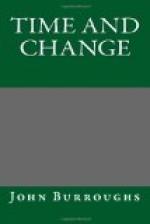Yes, good in everything, because law in everything, truth in everything, the sequence of cause and effect in everything, and it may all be good to me if on the right principles I relate my life to it. I can make the heat and the cold serve me, the winds and the floods, gravity and all the chemical and dynamical forces, serve me, if I take hold of them by the right handle. The bad in things arises from our abuse or misuse of them or from our wrong relations to them. A thing is good or bad according as it stands related to my constitution. We say the order of nature is rational; but is it not because our reason is the outcome of that order? Our well-being consists in learning it and in adjusting our lives to it. When we cross it or seek to contravene it, we are destroyed. But Nature in her universal procedures is not rational, as I am rational when I weed my garden, prune my trees, select my seed or my stock, or arm myself with tools or weapons. In such matters I take a short cut to that which Nature reaches by a slow, roundabout, and wasteful process. How does she weed her garden? By the survival of the fittest. How does she select her breeding-stock? By the law of battle; the strongest rules. Hers, I repeat, is a slow and wasteful process. She fertilizes the soil by plowing in the crop. She cannot take a short cut. She assorts and arranges her goods by the law of the winds and the tides. She builds up with one hand and pulls down with the other. Man changes the conditions to suit the things. Nature changes the things to suit the conditions. She adapts the plant or the animal to its environment. She does not drain her marshes; she fills them up. Hers is the larger reason—the reason of the All. Man’s reason introduces a new method; it cuts across, modifies, or abridges the order of Nature. I do not see design in Nature in the old ideological sense; but I see everything working to its own proper end, and that end is foretold in the means. Things are not designed; things are begotten. It is as if the final plan of a man’s house, after he had begun to build it, should be determined by the winds and the rains and the shape of the ground upon which it stands. The eye is begotten by those vibrations in the ether called light, the ear by those vibrations in the air called sound, the sense of smell by those emanations called odors. There are probably other vibrations and emanations that we have no senses for because our well-being does not demand them.
We think it reasonable that a stone should fall and that smoke should rise because we have never known either of them to do the contrary. We think it reasonable that fire should burn and that frost should freeze, because this accords with universal experience. Thus, there is a large order of facts that are reasonable because they are invariable: the same effect always follows the same cause. Our reason is developed and disciplined by observing the order of Nature; and yet human rationality is of another order




